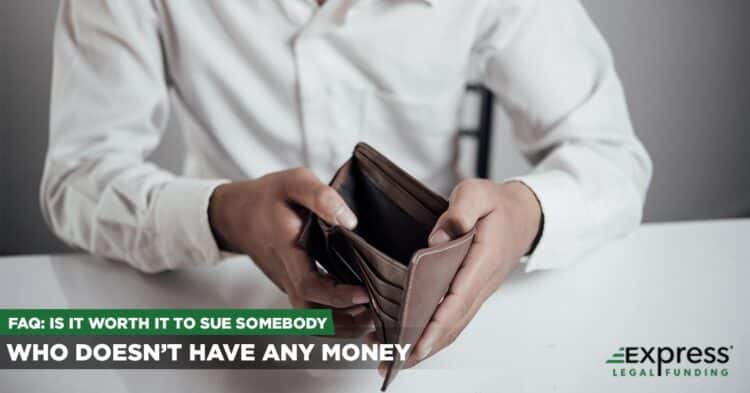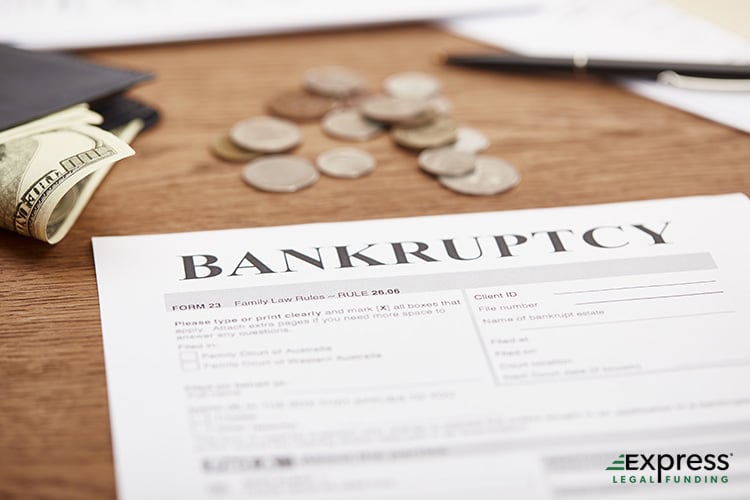
Civil lawsuits are primarily meant to give you the means to recover financially from someone else’s negligence or misconduct. This legal process has been used for years to ensure justice is met for every victim of another party’s mistakes or even crimes.
However, since most civil lawsuits are to sue for money, you should always have a few concerns before you decide to sue someone. Specifically, whether the party you would be filing a suit against has any money to compensate you in the first place.
In a lawsuit where you are trying to recover from the financial loss caused by the other party’s actions, making sure they can afford to repay you is essential.
Unfortunately, not every lawsuit can be filed against a defendant with the financial resources necessary to compensate you for your damages or lost wages.
While the party you file against might not have much in the way of funds they can use to pay you in a settlement or court award, you might still want to consider filing a claim.
Given the current economic climate, cases involving those lacking in finances are far more common. This article will provide insight into as well as some pros and cons of whether it is worth filing a claim against someone who has no money(at the moment).
So let’s dive into some options when suing someone who does not have money and why everyone following the law and purchasing car insurance can protect you even when the other driver responsible for the accident has no money themselves to sue for.
Can You Sue Someone Who Has No Money?
Yes, you can sue someone when they have no money in a civil lawsuit. Not having money does not absolve their civil liability for their harmful and negligent actions against you.
However, the more critical question is whether it makes economic sense to sue someone with no money to pay you when they lose the case.
You can do things to increase your chances of getting paid the money you are owed from the judgment, but that will take additional time and money. There are ways both you and the responsible party are protected in these situations even if they have no money to sue for:
Defendant Has Insurance Coverage That Will Pay the Claim
With car accidents and liability lawsuits, there is a good chance the party has insurance coverage. That means you can still sue the person who has no money, but in this case, it would be worth it because the insurance company would be the party that writes you the check paying you for your injuries and damages at the end of your successful claim.
How Do You Collect a Judgment Lien?
Typically, when you file a lawsuit in court against another party for financial losses, a check will be written if the case settles in your favor before it goes to trial. However, this is only when the defendant’s finances are stable enough to properly pay for a fair settlement.
However, when the defendant in the claim is found to lack the money and financial resources necessary to pay for a fair settlement or court judgment, you can address this lack of payment through alternate collection methods post-trial while still relying on the legal and court systems.

Ways to Collect a Judgment:
Some of the most common collection alternatives and repayment plans include:
-
Wage Garnishment:
The simplest and most common means for collecting from a financially unstable defendant’s wages is the court-ordered process of garnishing the defendant’s wages.
If the defendant with the judgment placed against them makes an average income or above, most states will allow you to garnish up to 25% of their future income wages.
That means each time the defendant receives their salary, a percentage of the defendant’s wages will be sent to you to pay off the court judgment they still owe you for your losses and damages.
There are exceptions, however, as certain low-income workers will be exempt from garnishment depending on your state. For example, you generally can not garnish federal government benefits and most pensions, including:
- Welfare
- Most Pensions
- Social Security
- Supplemental Security Income (SSI)
- Unemployment benefits
- Child support
- Aged, Blind, or Disabled (ABD)
- Civil Service Retirement System
- Veteran’s Administration (VA) benefits
-
Place a Levy On Business Assets:
If the defendant who loses the claim in court is a business owner who cannot offer a proper settlement, the settlement might be compensated by liquidating the business’ assets.
This generally means that they will be forced to sell expensive equipment or machinery so they can put the proceeds of the sale towards repaying you.
It is also possible to perform a “Till Tap,” where law enforcement will directly pull the funds from the business’ bank account or cash register. Till Taps, also known as Keepers Levy’s, are generally associated with small claims courts and can involve the local Sherriff.
-
Place a Levy On Personal Assets:
If the defendant who does not have any money also does not qualify for wage garnishment or does not have business resources, a similar option exists for their personal belongings.
Suppose the garnishment of wages or disseminating business assets is impossible. In that case, it is possible to have the defendant’s personal property such as furniture, real estate, motor vehicles, and stock investments being levied.
While this option requires a little more patience, you will have the funds sent straight to you when the defendant sells these different forms of personal assets.
Repayment Plans
As you can see, there is more than one viable option for substituting a generic settlement or court judgment check from a financially compromised party. The only major disadvantage is that collecting what you are rightly and legally owed takes patience and is a little more time-consuming.
Whether you pursue a small claims case against an individual in a small claims court or against an insurance company in front of a jury in a courtroom, you can receive the compensation you are owed. Still, of course, the first step is to have the case’s verdict being in your favor.
There are some scenarios where the law will prevent you from pursuing a claim against such a debtor.
Can Judgment Debtors Claim Exemption?
While you are entitled to restitution for your losses and damages when another party causes you harm or damages your property, there are limitations on how and when you exercise your right.
Sometimes, extenuating circumstances prevent you from seeking a settlement from the defendant when funds are unavailable to them.
In some cases, the defendant can attempt to prove that settling for the situation would leave them wholly destitute, and if successful, the debtor can save themselves from the judgment debt owed to you, the creditor.

Exemptions and Judgment-Proof:
-
Become Judgment-Proof:
When you pursue a judgment from a defendant with no money to pay, they have the option to try and prove that they are exempt from judgment.
Often this is done by filing an Affidavit, in which they testify to being declared “judgment-proof,” which means that they seek to prove that they lack the resources needed to pay off the claim and that attempting to collect from them would leave them utterly destitute.
If they are declared judgment-proof, they might earn an exemption from certain financial obligations to you. However, being judgment-proof is not a defense against the civil lawsuit, as you won the judgment when you sued the person without money, but rather for that person to prove they do not have to pay that judgment based on their economic situation.
-
Filing a Chapter 7 Bankruptcy:
A financially insolvent defendant can, in an emergency, file for bankruptcy. When someone files bankruptcy, they officially declare that they cannot pay any debts they have.
Still, this does not mean they get off scot-free without paying their debts, as bankruptcy severely affects their financial standing. However, if they go ahead and file a Chapter 7 bankruptcy, which is a complete wipeout, it can make collecting from them impossible.
-
Declaration of Exempt Income and Assets:
Sometimes, the defendant can file an Affidavit for what is known as a Declaration of Exempt Income and Assets. This written form of sworn testimony protects specific financial resources from being garnished or levied by debt collectors.
These declarations generally cover particular assets and will not allow them to declare their income as off-limits. However, it can prevent you from collecting specific resources.
There are very few exemptions for defendants who owe money for damages they caused. The existing ones are challenging to secure and do not fully protect them from financial repercussions or obligations. However, it can harm the odds of you collecting a judgment from them.
While a defendant getting an exemption from paying the judgment is rarely the case for personal injury lawsuits and will likely be a minor concern even if your case is in small claims court, it is something to keep in mind.
In reality, having a lawsuit against a financially insolvent party with no money to compensate you is not unheard of. While considering potential exemptions is an important step, there is more to consider when seeking a lawsuit against this type of defendant.
How Long Does a Judgment Lien Last?
When you successfully pursue a financially insolvent party for a court award, a judge’s court order generally breaks down the payment plan. Depending on the outcome of the court case, this payment plan can be split into liens to which you (the judgment creditor) hold the rights.
However, the judgment that allows you to keep those liens is not indefinite. If the default judgment expires before the defendant can pay off what they still owe, you risk losing out on the unpaid amount you are owed if you do not renew the judgment before the expiration date.

As with virtually any legal ruling or criminal act, there is a statute of limitations on how long the situation remains legally viable or pursuable in the eyes of the law.
This timeline, statute of limitations, on judgments changes depending on the state where the judgment was made—the different state timelines for when court award judgments expire vary significantly. The time limits by the state are:
The Statute of Limitations For Judgments in 50 States:
- Judgments made in Washington D.C. are valid for three years.
- Judgments made in Pennsylvania are valid for four years.
- Judgments made in Arizona, Idaho, Kansas, Nebraska, and Oklahoma are valid for five years.
- Judgments made in Nevada are valid for six years.
- Judgments made in Georgia, Illinois, and Mississippi are valid for seven years.
- Judgments made in Utah and Vermont are valid for eight years.
- Judgments made in Alaska, Arkansas, California, Hawaii, Louisiana, Michigan, Minnesota, Missouri, Montana, North Carolina, North Dakota, Oregon, South Carolina, Tennessee, Texas, Washington, and West Virginia are valid for ten years.
- Judgments made in Maryland are valid for 12 years.
- Judgments made in New Mexico are valid for 14 years.
- Judgments made in Kentucky are valid for 15 years.
- Judgments made in Alabama, Colorado, Connecticut, Florida, Indiana, Iowa, Maine, Massachusetts, New Hampshire, New Jersey, New York, Rhode Island, South Dakota, Virginia, and Wisconsin are valid for 20 years.
- Judgments made in Ohio are valid for 21 years.
- Judgments made in Delaware have no expiration limit.
Renew The Judgment
If you want to ensure that the judgment liens stay in place for you to collect from the financially insolvent defendant, you will need to keep renewing the judgment within the statute of limitations for the state where the judgment was made.
For example, a judgment set on January 1st, 2022, in Texas would expire on January 1st, 2032.
To protect the lien, you must submit a request to renew the judgment before this date with time to spare. Remember that these statutes are subject to change as the state’s government changes. You might need to consult with a state court clerk’s office to ensure that you have accurate information.
While renewing the judgment lien increases the time you have to collect the total judgment amount from your debtor, there are still limitations to what you can legally place a lien on, which begs the question of how worthwhile the case is.
Is It Worth The Expense Suing Someone With No Money?
You retain the right to seek damages from a financially insolvent party that caused you personal injury, damaged your property, or otherwise is responsible for monetary damages. Very little can be done to stop you from exercising that right.
However, whether it is worth the effort is another matter and must be considered carefully.
A financially insolvent defendant means there will be a significant delay in recovering your financial losses. This likely means you will have paid off all the associated costs of the case long before you see your expenses returned.
While you can garnish wages or place liens on their property, the payments would be expected to come on a regular schedule if you negotiate a payment plan.
However, this does not mean you will end up waiting eternally for a payment that will never come. That said, you also need to consider the loss you suffered due to the incident and weigh whether the potential damages are worth the effort.

There will always be situations where the legal action ends up being more expensive than the reward you might get. However, other times the reward from a case like this can be worth the wait since you will be able to recover from most of your losses financially.
Whether or not it’s worthwhile to pursue a lawsuit against someone without the necessary amount of money depends on you and your circumstances.
For example, if it costs you thousands of dollars to seek legal help for auto accident damages, it may not be worth the risk. The decision becomes easier if you have extensive property damage and are currently without a home. The best option is to take stock of your losses and damages against the time it will take to recover them from the defendant.
If you are going to be waiting for a payoff despite the damages, you might find yourself in need of financial assistance before the lawsuit is closed.
Until then, you will still be obligated to make payments on medical bills, repairs to your home, car accident damages, and paying for any filing fees. Fortunately, there is a way to find that help.
How You Can Sue Someone When They Have No Money
Suing a party that doesn’t have any money or assets can be complicated and time-consuming. If the defendant lacks funds and real property, it will take far longer to recover from the losses you suffered than in an average claim.
However, you can quickly assess the worth of such a claim by comparing what was lost with what you stand to gain.
In most cases, pursuing a lawsuit against a financially insolvent party is the right idea unless the potential recovery is so low that you would end up spending more than you could gain.

That said, we do not know the specifics of your case, nor are we a law firm giving you legal advice. So we do not intend to provide guidance on your specific situation as not only is your case’s situation unique the laws of your state will also change things.
So as always, we recommend you consider consulting with a local attorney to get a case evaluation and more detailed legal information tailored to your case. However, when it comes to the financial side of having to wait through lawsuits, you might find yourself struggling – this is where we come in.
We at Express Legal Funding know that reality when pursuing a lawsuit, costs and medical expenses can quickly build up. Those costs and unexpected bills can increase rapidly and build up even faster when the primary defendant is financially insolvent and has no money to pay you after you sue them and win.
So between the rising cost of gas and the daily cost of living, you could find yourself without the funds to pay your month’s utilities or rent.
Lawsuits When a Liable Party Has Money to Pay
Fortunately, if you have a defendant with financial resources to sue and have hired an attorney on a contingency fee basis, we can offer our legal funding service to you.
It’s a lawsuit cash advance on the potential proceeds of your claim. That way, you can get some of your settlement or trial award money now to help pay your bills and buy the products you need. We get only repaid from a portion of your claim’s final settlement or trial award.
So, if you give it your all and go to court and lose, you do not have to repay us, as the potential of your case having a settlement or trial award is gone.
That is a complete loss for us, but a good thing for you is that you already got some of your lawsuit money advanced to you upfront. The legal funding cash is yours to keep debt-free.
That is a significant benefit of non-recourse pre-settlement funding and how it is supposed to work in your favor. You would still be a winner in that case because you got lawsuit funding on your pending claim.
If you need financial support during your legal battle, call your team at Express Legal Funding today and get in touch for a free consultation to learn more about pre-settlement lawsuit funding and to see how we can best help you.
